|
Tasting the unfamiliar 'Feast' brought together artists, food, allotments and school children in a year-long project to grow, cook and celebrate a feast. Eleanor Margolies visits the allotment. Photographs by Tim Mitchell.
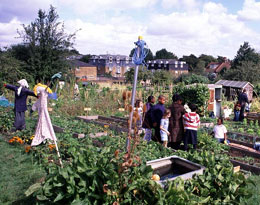
The Rosendale allotments |
If you cross the road from Rosendale Primary School in south-east London, unlock the gate to the Rosendale Allotments and climb Knight’s Hill, you enter a world of patchwork gardens. One plot is striped with raspberries and currants; another is occupied by bee hives. Some gardeners grow sunflowers, roses, courgettes, sweetcorn and sweet-peas. Others specialise in cabbages, or plants from Madeira. On one allotment, a bathtub overflows with mint; on another a flask of tea sits beside an old wooden chair.
A class of five- and six-year-olds arrive at the allotment beds for the Rosendale Primary School. Their teacher says:
‘First of all, look around and see what’s changed since you were last here’.
The children move between the raised beds, spotting fist-sized pumpkins hidden under enormous leaves and the pale green marbles of new tomatoes that have replaced the blossoms. They take turns to point out their discoveries to the whole class. There are gasps of surprise as a girl splits open a pod to reveal a row of peas. The class divides into groups to weed, water and harvest. They gleefully unearth potatoes and lever carrots from the ground with determined effort. At the end of the lesson, they carry the produce back to school where they will cook and eat it.
This is Rosendale’s second year on their allotment. It all started with 'Feast', a year-long project designed and organised by the artists Clare Patey and Cathy Wren through the London International Festival of Theatre (LIFT). The whole school was involved in creative activities led by visiting artists, while a small ‘core group’ of children worked closely with Catriona Andrews, a professional gardener.
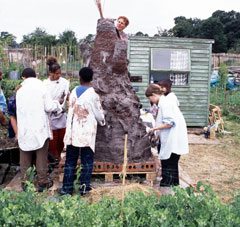
Building the kiln for firing clay plates |
The first public event was an open evening for parents and children, with a tasting of vegetables, to help decide what to plant, and a pooling of ideas about seasons and special days. Then artist and illustrator Sophie Herxheimer took up temporary residence in a shed on the allotment, keeping a visual diary of developments. At the summer solstice, children made ceramic plates with sculptor Martin Brockman, to be fired in a kiln shaped like a lion. They decorated fabric using vegetable dyes such as turmeric and beetroot with textile artist Madhumita Bose, and parents stitched the panels into tablecloths. In performance workshops, theatre director Mark Storer prepared the children for their role as hosts. Meanwhile, chef Ken Hawkesworth led cookery workshops and planned a menu with the school’s catering manager.
The year of creative, culinary and horticultural work culminated in a feast in which these elements came together. Over two nights, 400 people enjoyed a meal cooked with ingredients grown on the allotment. Tables were laid over the raised beds, labelled to show what once grew beneath the guests’ feet; children served soup (from watering cans), ratatouille, strawberries, raspberries and bread that had been baked in ovens constructed on the site. A choir sang a specially-composed grace.
Offshoots
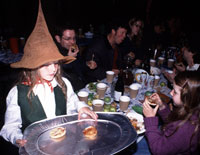
Serving the 'Feast' school dinner |
Throughout history and in every culture, the turning of the seasons has been marked by communal feasts. Through 'Feast', these city children experienced food, their environment and the seasons in new ways: tasting unfamiliar foods, learning how long it takes a tomato to grow, creating a festival, and witnessing the cycle of growth from seed to plant to flower to seed.
Clare Patey and Cathy Wren are currently working on a book about growing, cooking, and seasonality. The book draws on 'Feast' as an inspiration rather than offering a blueprint for replicating it. There will, however, be other school projects inspired by the Rosendale experience: in Birmingham, as part of the ‘Fierce’ festival; and in Aldeburgh, Suffolk, where a small primary school is planning a year-long project in which every lesson will relate to the growing process.
Firmly-rooted
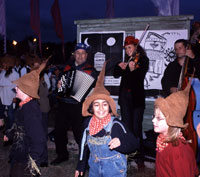
Celebrating the 'Feast' |
A year on, this one-off project has spread throughout the school, establishing roots in every classroom. The school’s environmental co-ordinator, Olivia Greenaway, says that the allotment is now seen as ‘part of the school’ and she has plans for next year: she wants to grow flowers alongside the vegetables and to find ways to hold more lessons outdoors on the allotment, where primary science curriculum topics such as ‘habitat’ or ‘eat more fruit and veg’ can come to life. Children who were once astonished by the dirt on freshly-pulled carrots now relish raw beetroot, encouraging each other to taste new foods.
For the ‘core group’ of children, working on the allotment was very different from school work: they gardened alongside others of different ages, in the open air; the work was physical but required care, patience and thought. Many gained confidence simply by getting to know others of different ages.
Clare Patey feels the conversations that took place as the children weeded were ‘some of the most important experiences of the year’.
The 'Feast' project was a rich experience for a small group of children and a year of creative excitement for hundreds more. The children who work on the allotment now talk about the purpose of compost, wash carrots in a water butt and pick a few late strawberries. There is a sense of absorption and observation alongside silly jokes and groans about hard work. They spot butterflies and caterpillars, and compare the taste of the spinach this week to that of two weeks ago, and bury their hands in the soil. One boy is enjoying his first experience of digging. ‘I want to have a garden with weeds’.
The Rosendale experience shows that nature can be experienced in the heart of a city. A local allotment also creates new connections with the community. Neighbouring plot-holders of different ages and backgrounds greet the children, comment on the innovations and offer advice. The allotment has become part of the children’s world.
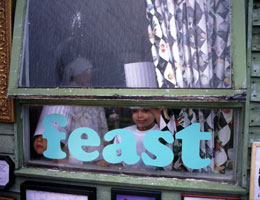
A new window on the world |
© Eleanor Margolies
published in 2004
|
Throughout history and in every culture, the turning of the seasons has been marked by communal feasts. Through 'Feast', these city children experienced food, their environment and the seasons in new ways:
tasting unfamiliar foods, learning how long it takes a tomato to grow, creating a festival, and witnessing the cycle of growth from seed to plant to flower to seed.
|